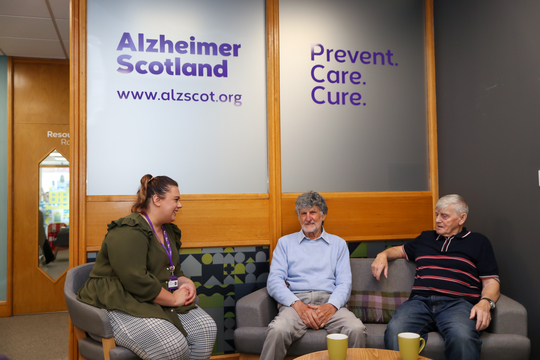Living with dementia
Everyone experiences life differently, and this means there is no set way to live your life after a dementia diagnosis.
Living well with dementia
Dementia is a progressive illness, and your symptoms will change over time, but access to the right information and support can help you to live well after your dementia diagnosis.
This page offers practical advice to help you live independently after a diagnosis and also information on where to turn when you need support.
Support with living well
A positive approach that focuses on abilities rather than limitations will make a significant difference to how you live life with dementia, but as your dementia progresses it will begin to affect more aspects of your life, as well as the lives of those that care for you.
If you do need help, don’t be afraid to ask for it. Whether it is from family and friends, professionals such as doctors and nurses, or Alzheimer Scotland, support is available for you.
Alzheimer Scotland provides services and support across Scotland and can help if you need information and advice, peer support and personalised support services, including day opportunities or activities and groups in your community.
Our network of Dementia Advisors, our Brain Health & Dementia Resource Centres, and our 24 hour Freephone Dementia Helpline, help to make sure you are not facing dementia alone.
We also have a range of information leaflets, supports and products which can help support you, your friends and your family.
Our resource booklet ‘Dementia: After diagnosis’ tries to answer some of the questions you may have after receiving a diagnosis of dementia. Each section looks at a different area of your life and suggests ways to adapt to any changes you may face
Next steps
Living with dementia can be challenging and may trigger a mixture of emotions for you and the people who care for you.
After a dementia diagnosis it is inevitable that there will be a lot for you to consider and there will be questions you want to ask.
For example, you may want to consider developing a care plan with your healthcare provider, work with a legal professional to set up powers of attorney, or identify family members, friends, or caregivers who can be your support network as the condition progresses.
The important thing to remember is that there is always help and support available. Alzheimer Scotland is proud of the work we do to make sure nobody faces dementia alone. Use the links below to learn more about living well with dementia.
Alternatively, if you want to talk to someone today, you can call our 24 Hour Freephone Dementia Helpline: 0808 808 3000
Advice for staying independent while living with dementia
-
Talking about your dementia and staying connected
When the time is right for you, it is a good idea to talk to others about your dementia diagnosis. By explaining your diagnosis, and the ways it may affect your life, those closest to you can understand what dementia means to you and feel more comfortable offering help.
Maintaining relationships with friends and family after a dementia diagnosis will provide emotional stability and a sense of normalcy. It will also help your loved ones support you as your dementia progresses in a manner that respects your boundaries and personhood.
If you are friends with someone living with dementia you can download our Friendship and Dementia leaflet.
Download: Friendship and dementia
-
Maintain your physical and mental health
A healthy, balanced diet, drinking plenty of fluids and regular exercise may seem like everyday advice, but it takes on extra significance if you are living with dementia.
Making good food choices ensures your brain gets the nutrients it needs and even gentle activities such as walking, swimming or yoga can improve mood and help maintain cognitive function.
You can get more detailed information on healthy living with dementia by downloading our booklet
Download: Healthy living and dementia
-
Ensure you attend regular medical check-ups
If you have a long-term health condition, such as diabetes or heart disease, try to attend regular check-ups with your doctor. Conditions like these affect your brain health and can also affect decisions around any medication prescribed for your dementia.
Talking to your doctor if you start to feel unwell is also important. Things like chest or urine infections can cause confusion if they are left untreated.
Your mental health is important too. Depression and anxiety can occur when living with a progressive illness like dementia, but it doesn’t have to stop you living well. Your doctor will be able to offer treatments that can help.
-
Make sure you take adequate rest
Your brain cleans itself while you sleep, flushing out waste products that build up throughout the day. Getting seven to nine hours of good quality sleep every night will help your brain function, provide necessary energy and encourage positive mental health. Avoiding caffeine and alcohol at night can also help with this.
Making time for yourself and relaxing during the day can also help reduce stress, which is a key part of keeping your brain healthy. However, you should try to avoid naps that will disrupt your sleep pattern.
Download: Sleep and dementia
-
Establish routines and consistent daily schedules
Establishing a regular routine can make everyday tasks more manageable when living with dementia. Any of the following tips can help you to maintain certainty and confidence throughout the day:
- put a timetable on the kitchen wall or fridge to help plan the day
- get a diary or calendar for planning further into the future
- put items you need to hand, like keys or a purse, in the same place every day
- keep a list of helpful numbers by the phone
- make your regular bills payable by direct debit
- if you use medication, get a pill organiser box to remind you what to take and when
- use post-it notes and labels to help you remember important information e.g.
- a note by the door to remind you to lock up at night
- labels on cupboards to remind you where things are
-
Create a dementia friendly environment at home
Dementia friendly products and modifications can help you safely maintain independence in your home as your dementia progresses.
A needs assessment organised through your local council’s social work department can identify necessary home alterations, such as grab rails, but simple changes such as the following will also help:
- allow bright, even, natural lighting into your home where possible
- reduce glare and shadows, particularly on stairs and in the toilet
- use automatic light sensors to help navigation when waking at night
- avoid rugs and shiny floor surfaces to prevent trips or falls
- use contrasting colours to distinguish floors, doors, banisters and walls
- consider labels or see-through doors on cupboards to help identify their contents
- buying dementia-friendly products like clocks with larger displays, transparent kettles and toasters or a voice-activated digital assistant, like Alexa or Google Home, to set alarms and reminders
Donwload: Making your home dementia friendly
-
Review your needs, care and support options
As your dementia symptoms progress you may wish to review your needs and how your dementia is affecting your day-to-day life.
Things you may want to consider include:
- investigating any benefits you might be entitled to
- legal matters such as power of attorney
- speaking to your employer about your workload if you have returned to work
- your ability to drive
Advice on these matters can be sought through your support workers, Citizens Advice Bureau and Alzheimer Scotland among others.
Further support

Local workshops
Alzheimer Scotland hosts various workshops locally which provide you with information and practical solutions to help adjust to life with a dementia diagnosis. Some workshops are for people with dementia, some are for partners, families and carers and many are for both together.

Dementia Advisors
If you need information, advice or advocacy in dealing with issues related to dementia, our Dementia Advisors are here to help you. They can help with a wide range of issues such as accessing health and social care support, help with complaints, power of attorney, guardianship, and money and legal matters.

ADAM
ADAM (About Digital and Me) is a platform which will help you find the right pieces of technology to look after your health and wellbeing. Everything in ADAM’s catalogue has been tested by families living with dementia, and our expert Digital Team, to ensure that they are something that is likely to be useful.
More information
Getting a diagnosis
Learn how to get symptoms of dementia evaluated
Newly diagnosed
What are the next steps after receiving a dementia diagnosis
Types of dementia
Learn about the different types of dementia that exist
Dementia Advisors
Learn more about our National Dementia Advisor Service
Community & support
Find out what support is available in your local community
Get involved
Get involved with the support work provided by Alzheimer Scotland
Talk to us
Would you like to talk to someone about living with dementia? You can call our 24 hour Freephone Dementia Helpline on 0808 808 3000 at any time.
Our Helpline is staffed by trained volunteers. Many of the volunteers have had personal or professional experience of caring for people with dementia. The Helpline team can provide information, signposting and emotional support.
